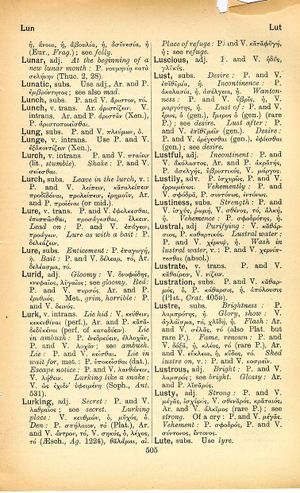lure: Difference between revisions
From LSJ
(CSV4) |
m (Woodhouse1 replacement) |
||
| Line 1: | Line 1: | ||
{{Woodhouse1 | {{Woodhouse1 | ||
|Text=[[File:woodhouse_505.jpg|thumb|link={{filepath:woodhouse_505.jpg}}]] | |Text=[[File:woodhouse_505.jpg|thumb|link={{filepath:woodhouse_505.jpg}}]] | ||
P. and V. ἐφέλκεσθαι, ἐπισπᾶσθαι, προσάγεσθαι, ἕλκειν. | ===verb transitive=== | ||
[[prose|P.]] and [[verse|V.]] [[ἐφέλκεσθαι]], [[ἐπισπᾶσθαι]], [[προσάγεσθαι]], [[ἕλκειν]]. | |||
[[lead on]]: [[prose|P.]] and [[verse|V.]] [[ἐπάγειν]], [[προάγειν]]. | |||
[[lure as with a bait]]: [[prose|P.]] [[δελεάζειν]]. | |||
===substantive=== | |||
[[enticement]]: [[prose|P.]] [[ἐπαγωγή]], ἡ. | |||
[[bait]]: [[prose|P.]] and [[verse|V.]] [[δέλεαρ]], τό, [[Aristophanes|Ar.]] [[δελέασμα]], τό. | |||
}} | }} | ||
Revision as of 08:54, 20 May 2020
English > Greek (Woodhouse)
verb transitive
P. and V. ἐφέλκεσθαι, ἐπισπᾶσθαι, προσάγεσθαι, ἕλκειν.
lead on: P. and V. ἐπάγειν, προάγειν.
lure as with a bait: P. δελεάζειν.
substantive
enticement: P. ἐπαγωγή, ἡ.

